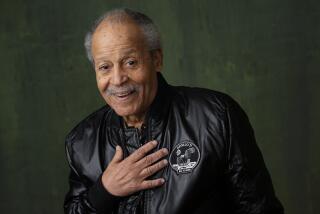Brothers of Invention
- Share via
A few years ago, a massive national poll produced a ranking of the 20th century’s top news stories. First was the atomic bombing of Japan. Second was the Pearl Harbor attack. Third was the moon landing. Little noticed at the time and since was that none of the top three could have happened without No. 4: the invention of the airplane. This morning, as quiet as an uninhabited sand dune, the nation begins its official yearlong centennial marking of the first flight by two bicycle makers, the Wright brothers from Dayton, Ohio, on Dec. 17, 1903, at Kitty Hawk, N.C.
Humanity’s first four recognized controlled flights (not counting the Icarus fiasco) were unpublicized by intent because Orville and Wilbur hadn’t received their airplane patents yet.
What the pair of unschooled engineers pulled off that day, after centuries of dreaming and generations of failing, would at first slowly and then ever more rapidly change life on Earth, its history, its wars, its lifestyles, technology, research priorities, even the face of the moon.
Just think what flight has done and allowed. Humanity and its imaginations soaring in the sky where once only gods resided. The explorations, adventures and rescues, the surveys, maps, studies and awesome scenes recorded for others far away. Flight not only altered marketing -- enabling, say, farmers to sell perishables to distant customers -- it permitted widespread organ transplants, freed global travel, tourism and recreation from steam engines and created the short-term transcontinental and transoceanic commutes now underway for the holidays. Plus freeway traffic reports.
Aerospace became a powerful global economic engine for technology, industry and jobs, especially in California. Aviation also created a pantheon of heroes: Charles Lindbergh and Amelia Earhart to Chuck Yeager and Neil Armstrong. Not to mention corporate legends whose stories and mergers are less familiar than their last names -- William Boeing, Donald Douglas, Glenn Curtiss, Glenn Martin, Igor Sikorsky, Jack Northrop and someone named Alan Loughead, who grew frustrated with his name’s mispronunciations and changed it to Lockheed.
As with all new things in history -- say, for example, the gunpowder in fireworks -- some conjured ways to use airplanes to kill and destroy. Others saw in flight a rapid means to rescue the injured or get food and medicine to victims of disease and disaster.
After nearly 100 years, a few air travelers remain stumped by overhead luggage bins and seat belt clasps. Some of us with limited chin-up capabilities may never comprehend how a 747 weighing 747,000 pounds can lift off the ground that way and stay there. And the recent bankruptcy filing by United Airlines reminds all of the legacy of economic storms encountered by Braniff, TWA, Pan Am, Eastern, America West and US Airways.
Except for all that, the earnest poll ranking manned flight as last century’s fourth-most-important story was right on.
More to Read
Sign up for Essential California
The most important California stories and recommendations in your inbox every morning.
You may occasionally receive promotional content from the Los Angeles Times.












